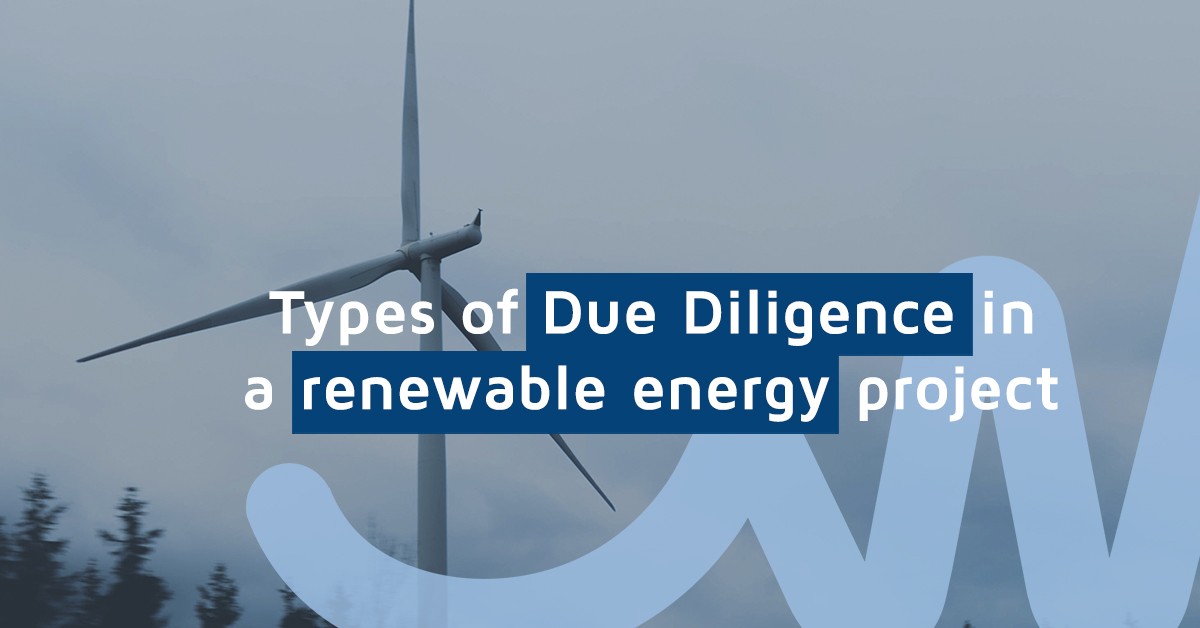Types of Due Diligence in a renewable energy project
As in other sectors, Due Diligence is an essential element for the legal, financial, and technical auditing of renewable energy projects. Regardless of whether it is a solar, wind, hydrogen, or any other type of technology project, Due Diligence allows the different players involved (developers, owners, investors, financial institutions, etc.) in a transaction, to assess the risk involved in each investment.
Thus, it´s therefore an analysis, carried out by independent experts in very specific areas, whose objective is to identify, assess and try to mitigate the potential risks associated with the project and therefore with the possible transaction.
Vector Renewables has a multidisciplinary and specialised team, which allows it to offer different types of Due Diligence, at any stage of the project, both in the development, construction and/or during the operation of the facility.
Types of Due Diligence offered by Vector Renewables
-
Technical Due Diligence.
This type of Due Diligence focuses on the technical aspects of the project, including the estimated production of the renewable assets, the technology used, the civil and electrical design, the status of permits, licenses, and authorisations, etc. In addition, this review may also include visits to operating plants or sites, audits of equipment manufacturers, monitoring of asset construction, etc.
Once the review of the above aspects and any other aspects requested by the client is completed, Vector Renewables will issue a technical report with a series of relevant conclusions and recommendations, so that the client can assess the possible risks, if any. -
Legal Due Diligence.
This focuses on the legal and compliance risks associated with the project. This includes the corporate aspects relating to the SPV holding the asset, including the review of the articles of association, the shareholder composition, the agreement between the partners or the deeds granted by the SPV, among others.
The legal DD also contains aspects related to the project (permits, licenses and authorisations), regulatory aspects and contractual aspects. The latter includes the review of contracts between the asset holding company (SPV) and a third party, including the possibility to amend the wording, so that the projects are in line with the market and, if necessary, bankable.
This type of due diligence can include in parallel aspects related to compliance, environmental aspects, litigation, possible claims, etc. -
Real Estate Due Diligence.
This type of Due Diligence includes the review of any contract with the aim of securing the land on which the project will be located (purchase and sale of land, leasing, surface rights, etc.). The analysis carried out by Vector Renewables will focus, among other aspects, on the technical and legal review of this type of document, as well as its correct registration in the Land Registry, etc. -
Fiscal Due Diligence.
This review focuses on the study of each sale and purchase operation of a company, allowing the seller or buyer to minimise the possible tax risks generated during its management and, with it, to improve their negotiating power in the face of the opposing party. -
Financial Due Diligence.
This is used to identify risks that may affect any of the parties to a transaction (such as the analysis of the historical evolution of the business through the calculation of prices and margins, net sales, or unit sales; the analysis of ebbtide and cash flows; etc.). These risks must be considered in the final valuation and must be addressed in the purchase contract of the transaction and so form of price adjustments, warranties, etc.
Financial due diligence should answer questions such as: Are we paying the right price according to the true past performance and business plan? Do we understand the market and its profit prospects? Do we have the potential to improve earnings and cash flows? What post-acquisition actions will be necessary?
Through its three business areas (Asset Management, Technical Advice and Legal and Financial Advice), Vector Renewables brings together technical, legal and financial knowledge, allowing the client to identify the totality of the risks of a transaction, seen from different perspectives. These competitive advantages offered by Vector Renewables provides its clients with a set of relevant conclusions and/or recommendations for them to assess and mitigate potential risks in their transactions.
When you subscribe to the blog, we will send you an e-mail when there are new updates on the site so you wouldn't miss them.

